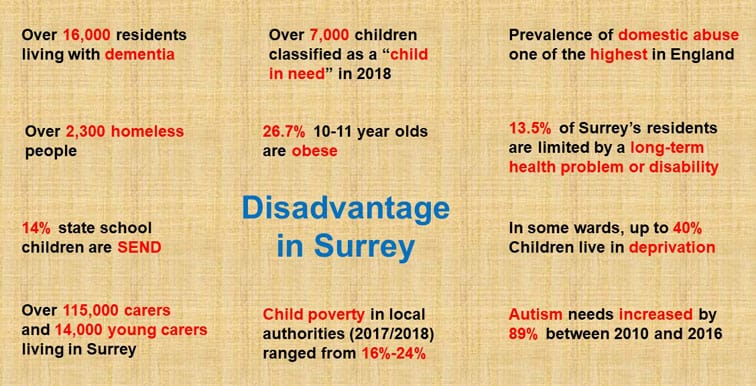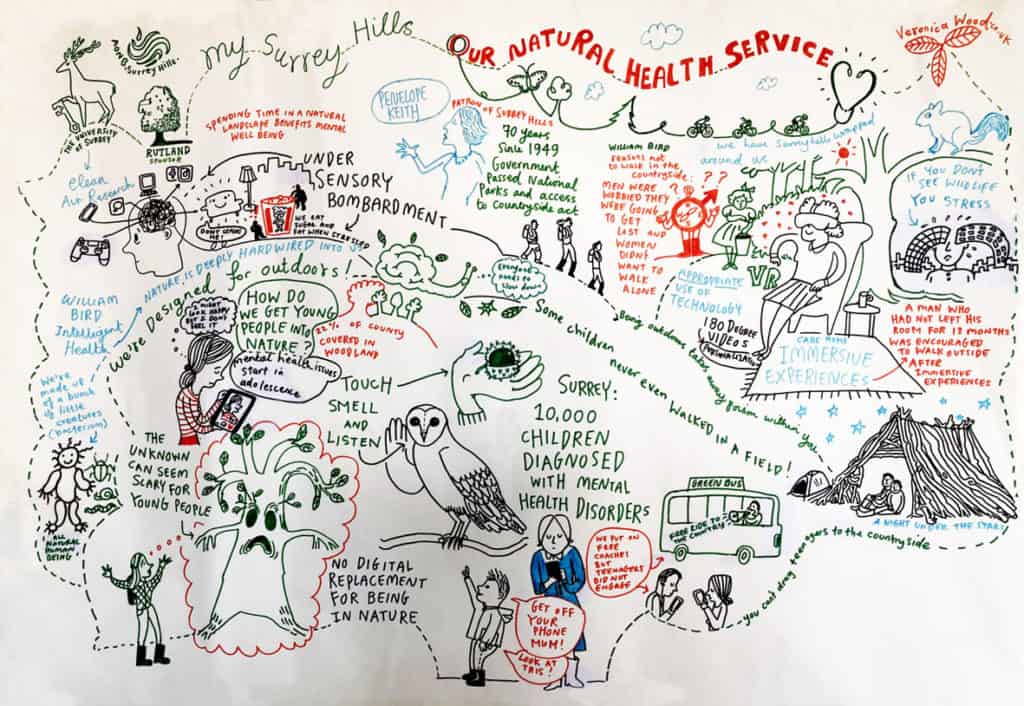“Into the Wild” – promoting health and well-being in our young disadvantaged communities
During the last few months, there has been a renewed focus on the benefits of being outdoors. Of course, this is something that all of us connected with the Surrey Hills have known for some considerable time. Last year, the advisory panel to the Surrey Hills Trust Fund decided that one of its key objectives would be to promote the important role that the AONB can play in promoting health and well-being for all ages. However, we recognised that, whilst the Trust Fund could provide seed funding for certain projects, the best approach would be to work in partnership with other charitable funds. It quickly became clear that to obtain this support we had to provide evidence-based research that demonstrated the need in Surrey, the way in which the need could be met and the barriers that existed.
Last November, we organised the Surrey Hills Symposium in conjunction with the University of Surrey. The theme was “Our Natural Health Service” and as part of the event we highlighted the research that had been commissioned by the Surrey Hills Trust Fund in conjunction with L C Energy and the University. This excellent report by Genevieve Lebus is entitled “Into the Wild”. It runs to nearly 100 pages and can be seen online here. Because this is such a wide topic we decided to focus initially on young disadvantaged groups, whilst recognising that immersion in nature can benefit all ages.
Some of the facts that emerged as a result of the research truly startled us all. It is very easy as you drive down the leafy lanes of Surrey or walk in the beautiful countryside to be totally unaware of the real deprivation that exists on our doorstep. The chart below contains some of the most disturbing statistics:

The average Surrey worker earns an income 22% higher than the national average, but thirteen neighbourhoods still fall into the 20% most deprived areas of the UK.
The report not only identified the need but went on to review the evidence, showing the impact that exposure to the countryside can have on mental and physical well-being. It was no surprise that the clear conclusion was that there are multiple advantages of engaging with the natural world. In addition to the physiological benefits of encouraging physical activity and boosting immune response, natural environments are successful in moderating the symptoms of low mental well-being. Nature’s restorative qualities significantly reduce feelings of stress or mental fatigue and allow people to escape the pressures of daily life. The outdoors also provides the opportunity for quiet reflection, as well as exercise, social group or educational/skills sessions that boost self-esteem and confidence. Furthermore, nature helps build resilience through encouraging young people to engage with an unpredictable environment in which they have to assess risk, make independent decisions and learn to adapt to their surroundings. Perhaps one of the most telling conclusions was that early intervention makes a huge difference to mental health in the longer term – encouraging young people out into the countryside can truly change their lives!

Of course, different people have very different needs and it was very clear from the research that it is impossible to adopt a ‘one size fits all’ approach. It is encouraging that there are a huge number of Surrey based organisations that are focussed on trying to meet some of the need identified, but there are some significant barriers that also exist. One of the main problems is the lack of education. Most people seem unaware of the benefits that nature can provide, or the negative consequences of departing from it. This has led to parent restrictions, societal rules, a blind acceptance of a technological way of life, and even a fear of the outdoors. It is clear that greater awareness is needed to highlight the importance of engaging with nature and hopefully incorporate it into mainstream culture.
In addition, another key barrier emphasised by local organisations was a lack of funding into relevant projects and interventions. Money is required to pay for equipment, volunteers and transport to help facilitate access to nature and to take young, disadvantaged people outside. Funding would allow organisations to expand and reach more of those who need help.
As a result of this research the Surrey Hills Trust fund is now working with the Surrey Hills AONB Board to develop a campaign that will promote the therapeutic benefits of activities in the Surrey Hills. Genevieve Lebus is assisting with the redesign of the Surrey Hills AONB website and we are starting by helping to fund certain youth groups to participate in a representative range of activities that will be videoed and widely promoted as part of a comprehensive communications plan. The Fund will then make grants to assist with the funding of disadvantaged children, who wish to go on the courses. However, the most important ambition is that, having started on this path, we can persuade other charitable funds to partner with us so as to expand the scheme and to make a real difference to young lives.



